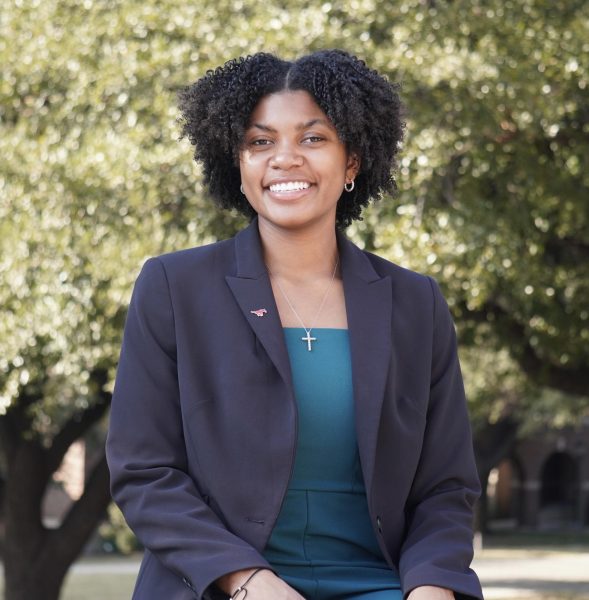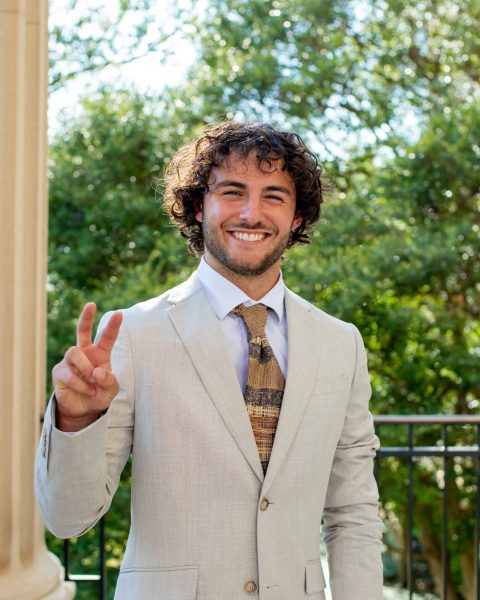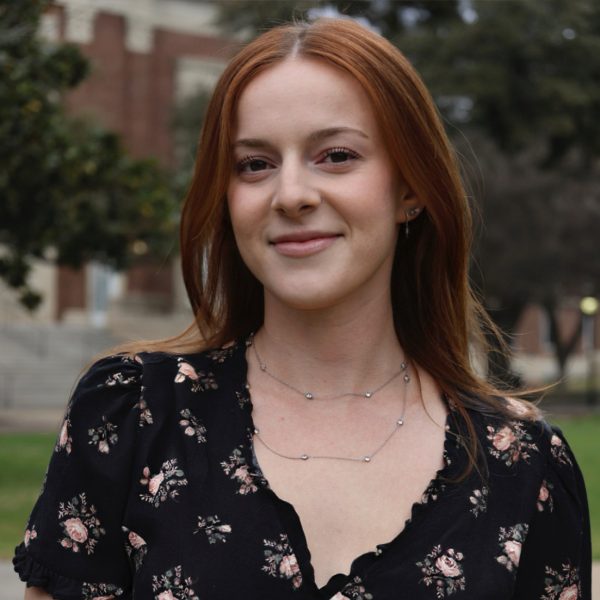At the beginning of last semester when The Daily Campus began its video segment, “Student Senate in a Minute,” our staff recalled senator campaigns that hoped to foster transparency. Many candidates cited student news organizations, like The Daily Campus, as a way to act on that campaign promise.
Through “Student Senate in a Minute,” reporters with The Daily Campus provide students, who may be unfamiliar with Student Senate proceedings, with a look at what happens every Tuesday afternoon in the Senate’s chamber. This election season, The Daily Campus hopes to build on that impactful reporting, spurring a more conscious campus who feels kinship with their student representatives.
In the past, The Daily Campus operated like other newsrooms, giving their own endorsements for Student Senate elections. David Huntley, who spoke at this year’s Black Excellence Ball and served as SMU’s first Black student body president from 1978 to 1979, recalled his endorsement from The Daily Campus. Our staff discussed the logistics of restarting newspaper endorsements, ultimately deciding it may pose a conflict of interest.
While The Daily Campus has chosen to forego endorsements, we do not give up on our dedication to transparency in our reporting. Our Senate Elections Board, composed of Katie Bergelin (Editor-in-Chief) , Melanie Jackson (Managing Editor), LuLu Garnett (Newsletter/Copy Editor), Camila Trevino (Social Media Editor) and Darcy Bass (General Assignment Reporter), sat down with candidates running for vice president. Both candidates received the same set of questions and gave the following answers.

Jazmin Darjean
A rising junior studying psychology and business management with a minor in Spanish.
Daily Campus: What’s one initiative you’ve pursued during your time in Senate? How does that initiative impact students or how will it impact students?
Jazmin Darjean: This past semester, I worked on a project to improve campus lighting. It started in December 2024 with gathering some information, ensuring that this is actually a project that was worthwhile and that people actually felt unsafe on campus. We found that that was true.
We had some dangerously low lighting levels around campus, so me and current Student Body President Michael Castle did a lot of work and met with SMU police. We did a campus night walk with some other senators, so we walked around and wrote down all of those [lights] that were either out or covered by trees to document what areas of campus were really dark. I made a report and sent that into SMU police and risk management. Risk management definitely nudged on facilities to be like, ‘Hey, what are y’all doing? We got this report from a student.’ Facilities took that information and did great work to improve the lighting on campus. They replaced over 100 light bulbs on campus and they are working on the installation of about 50 wall light packs around campus as well.
That’s definitely impacted students, especially our students that are disabled or our students that are women. That’s [the campus lighting initiative] just a really big thing for campus safety in general. I want to make sure that people feel comfortable while they’re walking around, especially with students that have night classes, they can’t really avoid walking around a campus at night.
DC: What’s one group or area of campus you feel needs more representation and how will you bring them into the conversation?
Darjean: I would say students that are not a part of Greek life. A lot of the time, we have a lot of emphasis on ensuring that students are having a good time within their Greek life, but also wanting to ensure that students that are not also have a good time here, and that they are able to make connections and be involved and everything like that. I feel like that was one area that I wanted to focus on, but on the opposite side is ensuring that Greek students are also involved with other things. It’s not just they come in and expect to only be involved in Greek life, but also find other avenues to express whatever they want to do here at SMU as well.
DC: What’s one faculty relationship you’ve honed during your time in Senate and how has that relationship benefitted you in your time in Senate?
Darjean: Dr. Mmeje. I’ve gotten to get really close with him through different events that I’ve been at. I also scheduled a one-on-one meeting with him to talk about some of my ideas that I had for Senate at the beginning of my sophomore year. He is a great person to go to for anything regarding student life. I thought he was a great person to tell these ideas and see what avenues I should go down to get some of these things done. That is where the lighting project came out of as well. I also work with Dr. Mmeje on the Vice President of Student Affairs Student Advisory Board. It’s a really long name, but basically it’s an advisory board that sits with Dr. Mmeje, Dr. Jennifer ‘JJ’ Jones, Dr. Watson, Reverend Garvin and other people like that. They’re just really important to understanding student life and student concerns, so I got to enhance my relationship with Dr Mmeje through that board as well.
DC: What specific policies or initiatives do you plan to introduce if elected?
Darjean: I have four main, overarching things. My first one is to support student voices through action. I feel like a lot of the time, Senate says we serve our constituency, but they don’t actually talk to their constituency. That’s the most important part, being on the ground with students, ensuring that we actually know their concerns, thoughts and values, and then actually taking action on those things. That’s not to promise that everything students come to me with will absolutely be done, but the first step to something being done is to actually know what is wrong, write that down, connect with people to see what we can do about it.
My second thing is to improve transparency of our Senate processes. A lot of the time, organizations and students don’t know what Senate does. They don’t know how to create their own organization or our finance processes, and I think we’ve done a pretty good job of improving that through our Outreach Committee. One of the ideas I have for that is making a compact and clear way to share with students the things that Senate can do and anything that they need regarding help with their organization. There is currently a packet that’s very similar to one the Student Center Activities office puts out, so possibly working with them to create something for students that is more succinct and better able for them to understand. Also working on the House of Representatives, ensuring that students know when it is and that they can come to increase transparency and communication between Senate and the student body. I want to create a calendar at the very beginning of the academic year that we publish so students know when our House of Representatives meetings are, when our town hall meetings are and when the elections will happen so that they’re not kept guessing.
My next one is to promote collaboration among campus groups. We’re all kind of separated sometimes and I really want to hone in on creating a very connected and collaborative campus. The summer after my freshman year, I served as an orientation leader and we tried to focus on, ‘How can we get students to really feel like an SMU student first and not a Greek student first or not an athlete first?’ We want them to think, ‘Oh, I’m an SMU student first.’ Working with different groups like the Office of Orientation and Transitions or Dr Mmeje’s office to ensure that people feel like an SMU student first and then they want to just take advantage of all these opportunities that we have here.
The last one is work to create more opportunities for student professional development. I recently learned through my job as a student ambassador that our Lyle School of Engineering has co-op programs. If they [students] finish classes and they want to have an internship, they can get credit for the internship rather than doing random classes here. Maybe introducing that for students in the Cox School of Business. I would be interested in introducing it for all of our schools, but I would start with Cox just because I feel like that would be a little bit more tangible. I’ve heard that people would be interested in that within Cox and I’m also a Cox student, so I’d be able to work with the leadership within Cox more directly.
DC: Besides The Daily Campus’ initiatives to show what goes on within the Senate chamber, how do you plan to keep students informed about Senate decisions and initiatives?
Darjean: Like I said in the beginning, making things for people to be able to read. Sometimes maybe they [students] don’t know about The Daily Campus Instagram page or they don’t have Instagram. I feel like a lot of times they do get a lot of emails which can be a little bit overwhelming for students, but ensuring when we do send emails that they are only for relevant information, then we’re not overloading students with information. Pretty well planned out messaging to where students know to expect a Senate update in their inbox. Also, encouraging students to come into Senate. I feel like a lot of the time, students don’t know that they can actually just come and sit in the Senate. Along with that, people can not only just come into Senate but also talk in front of Senate. Ensuring that people know about our speaker’s podium that we have in Senate, so they will actually come in and share any concerns they have, share any questions they have, things like that. We encourage people to come because that’s the whole point of us, being here to serve our constituencies and improve student life.

Omar Jaber
A rising junior studying finance and political science.
Daily Campus: What’s one initiative you’ve pursued during your time in Senate? How does that initiative impact students or how will it impact students?
Omar Jaber: Currently. I work as the Finance Chair of Student Senate, and that entails a lot. What the Finance Chair does is lead the finance committee. Within the finance committee, we make decisions based off of organizations that come in through weekly and we allocate that money, approximately $1.2 million is how much the finance chair oversees and allocates to all student organizations on campus. Regarding initiatives, we actually just made a new budgeting process, and it’s called the budget reform. It makes organizations have more flexible ways to spend their money. So instead of going line item by line, item for their budgeting annual budgets, they can just spend their money however they want, they’re not restricted to how many events they can have, and everything like that. So that’s the biggest change. It’s one of the biggest changes Student Senate has ever seen, so it’s really great.
DC: What’s one group or area of campus you feel needs more representation and how will you bring them into the conversation?
Jaber: I feel like Greek life and this general student body is separated, but I also think Student Senate itself is separated and is an outlier. The student body really doesn’t know what Student Senate does. Greek life doesn’t know what Student Senate does. So I want to bridge all three of those into one and make this a cohesive campus. I feel like that’s one area that we can really work on next year.
DC: What’s one faculty relationship you’ve honed during your time in Senate and how has that relationship benefitted you in your time in Senate?
Jaber: I was in the pre-law scholars my freshman year. Dr. Krogh was my WRTR teacher, and she completely changed my life. I’m not the greatest writer when it comes to writing essays. I came from a public school where I didn’t really take essays seriously but having her, she really pushed me in. I think the first paper, I got 79%, and I was freaking out. So I went to office hours, I talked with her, and she was like, ‘Omar, listen. I know you just came from high school, but it’s gonna be okay. Just work with me and I’ll help you do better on your next paper.’ Every paper after that, I got a 95% and above. She’s completely changed my writing and I still email her. I still visit her because her classroom is in my dorm. It’s really awesome and I really want to keep fostering that relationship because she’s great.
DC: What specific policies or initiatives do you plan to introduce if elected?
Jaber: We changed the budgeting system completely, and with that comes qualms for next year. We need to find a way to tweak those if there are any issues. One thing I do want to bring in is that I want to connect the campus together. I’ve wanted to come here since sixth grade. This is my dream school. This isn’t my backup or anything like that. This is the place I wanted to be, so I want to make this a cohesive campus that everybody feels welcome and everybody feels like their voice is being heard, while also like being a part of something much bigger than themselves, not just in their own individual organizations, Greek life or just Student Senate.
DC: Besides The Daily Campus’ initiatives to show what goes on within the Senate chamber, how do you plan to keep students informed about Senate decisions and initiatives?
Jaber: As the Finance Chair, it’s been great. I have a lot of contacts for all the treasurers and everything, so I really keep in close contact with them. Any questions they’ve had, they’ve emailed me. We fixed it. If I am elected vice president, I will oversee the outreach committee and in that committee, we talk to other organizations and what their problems are, not specifically just financial reasons, like I have been doing as finance chair, but a more macro view of that too. Reaching out to them, making sure everything’s okay, if there’s anything Student Senate can do for them, because Student Senate is there to help them. It’s not something that is just, ‘Oh, we’re going to govern you. You do this, you do that.’ We’re not like that. We’re trying to help, so as long as organizations know that and recognize that, we can do much more.














